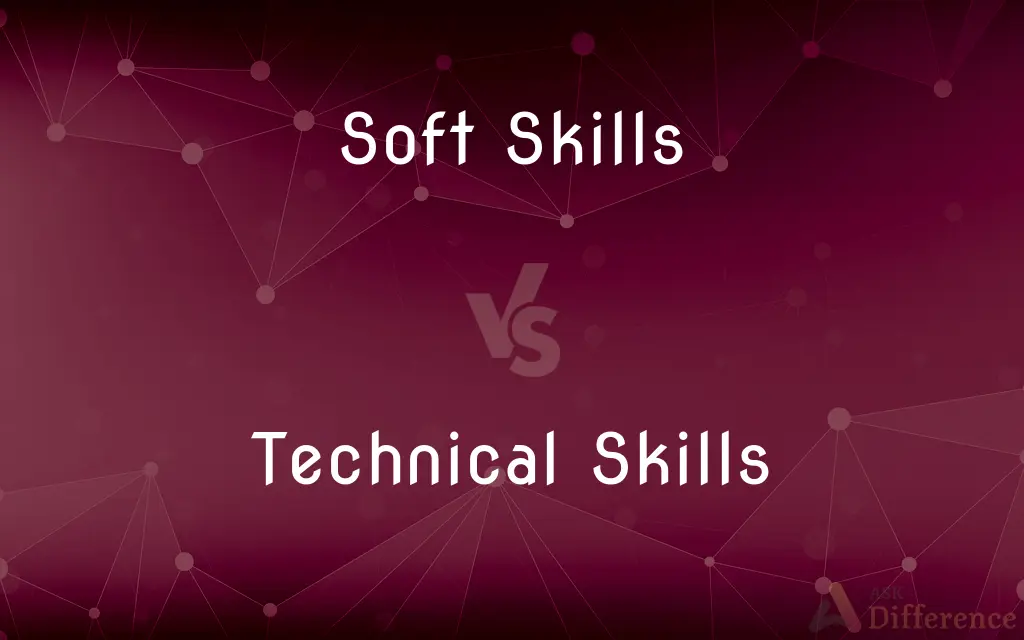Soft Skills vs. Technical Skills — What's the Difference?
Edited by Tayyaba Rehman — By Fiza Rafique — Published on November 22, 2023
Soft Skills refer to interpersonal and intrapersonal attributes, while Technical Skills pertain to specific, learned abilities tied to tasks or professions.

Difference Between Soft Skills and Technical Skills
Table of Contents
ADVERTISEMENT
Key Differences
Soft Skills represent the qualities and attributes that enable individuals to interact harmoniously and effectively with others. They encompass communication, leadership, and teamwork. On the other hand, Technical Skills specifically relate to the ability to perform tasks requiring specialized knowledge and training. While Soft Skills might dictate how someone collaborates in a team setting, Technical Skills could define their proficiency in a software tool.
Differentiating Soft Skills from Technical Skills can help employers better understand the competencies of potential hires. For instance, an individual might possess the Technical Skills necessary for a job, like coding in a particular language, but may lack the Soft Skills, such as effective communication, to thrive in a team setting. Conversely, someone might excel in Soft Skills but require training in the requisite Technical Skills.
In today's dynamic work environment, both Soft Skills and Technical Skills hold significant value. While Technical Skills ensure task completion and problem-solving, Soft Skills ensure a conducive work environment and efficient team dynamics. Balancing both Soft Skills and Technical Skills can lead to optimal workplace productivity and success.
The evolving nature of professions has spotlighted the importance of continual learning. As technology advances, the demand for certain Technical Skills may shift, emphasizing the need for adaptability. However, Soft Skills, rooted in human interaction, remain consistently valuable, often acting as a foundation that bolsters the application of Technical Skills.
Comparison Chart
Nature
Interpersonal and intrapersonal attributes
Specific, learned abilities tied to tasks
ADVERTISEMENT
Examples
Communication, leadership, empathy
Coding, machinery operation, data analysis
Acquisition
Gained through experiences and introspection
Obtained through formal training or education
Application
Across various settings and professions
Specific to certain tasks or professions
Evaluated through
Behaviour, interaction, and feedback
Tests, certifications, and task performance
Compare with Definitions
Soft Skills
Qualities that improve workplace dynamics.
Her Soft Skills ensured a positive and productive work environment.
Technical Skills
Measurable capabilities in performing specialized tasks.
Certifications often validate a person's Technical Skills.
Soft Skills
Intrapersonal qualities that define an individual's character.
His Soft Skills, like resilience and adaptability, helped him overcome challenges.
Technical Skills
Skills that involve tools, machinery, or specific techniques.
Operating complex machinery requires precise Technical Skills.
Soft Skills
Interpersonal traits aiding harmonious interactions.
Her Soft Skills made her an excellent team leader.
Technical Skills
Abilities acquired through training or education.
His Technical Skills in software development made him a valuable asset.
Soft Skills
Non-technical abilities that aid in personal and professional development.
Regular feedback can help improve one's Soft Skills.
Technical Skills
Knowledge-based competencies in particular areas.
Her Technical Skills in graphic design were evident in her portfolio.
Soft Skills
Attributes enhancing communication and collaboration.
Effective Soft Skills are essential for successful team projects.
Technical Skills
Proficiencies related to specific tasks or professions.
Engineers require several Technical Skills to design and implement solutions.
Common Curiosities
Are Technical Skills industry-specific?
Often, yes. Technical Skills usually pertain to tasks or professions, like coding for IT or machinery operation for manufacturing.
Can Soft Skills be taught?
While some Soft Skills are innate, many can be developed through experiences, feedback, and introspection.
Which is more important: Soft Skills or Technical Skills?
Both are crucial. While Technical Skills ensure task efficiency, Soft Skills ensure effective collaboration and a positive work environment.
What are Soft Skills?
Soft Skills refer to interpersonal and intrapersonal qualities, like communication and empathy.
Can one succeed with just Technical Skills?
While Technical Skills are vital, Soft Skills are often necessary for teamwork, leadership, and effective communication.
How do Technical Skills differ from Soft Skills?
Technical Skills are specific, learned abilities tied to tasks, while Soft Skills involve personal and interpersonal attributes.
How can I improve my Soft Skills?
Self-awareness, feedback, training, and real-world experiences can enhance Soft Skills.
Share Your Discovery

Previous Comparison
Nervous Breakdown vs. Panic Attack
Next Comparison
Marginal Costing vs. Differential CostingAuthor Spotlight
Written by
Fiza RafiqueFiza Rafique is a skilled content writer at AskDifference.com, where she meticulously refines and enhances written pieces. Drawing from her vast editorial expertise, Fiza ensures clarity, accuracy, and precision in every article. Passionate about language, she continually seeks to elevate the quality of content for readers worldwide.
Edited by
Tayyaba RehmanTayyaba Rehman is a distinguished writer, currently serving as a primary contributor to askdifference.com. As a researcher in semantics and etymology, Tayyaba's passion for the complexity of languages and their distinctions has found a perfect home on the platform. Tayyaba delves into the intricacies of language, distinguishing between commonly confused words and phrases, thereby providing clarity for readers worldwide.
















































